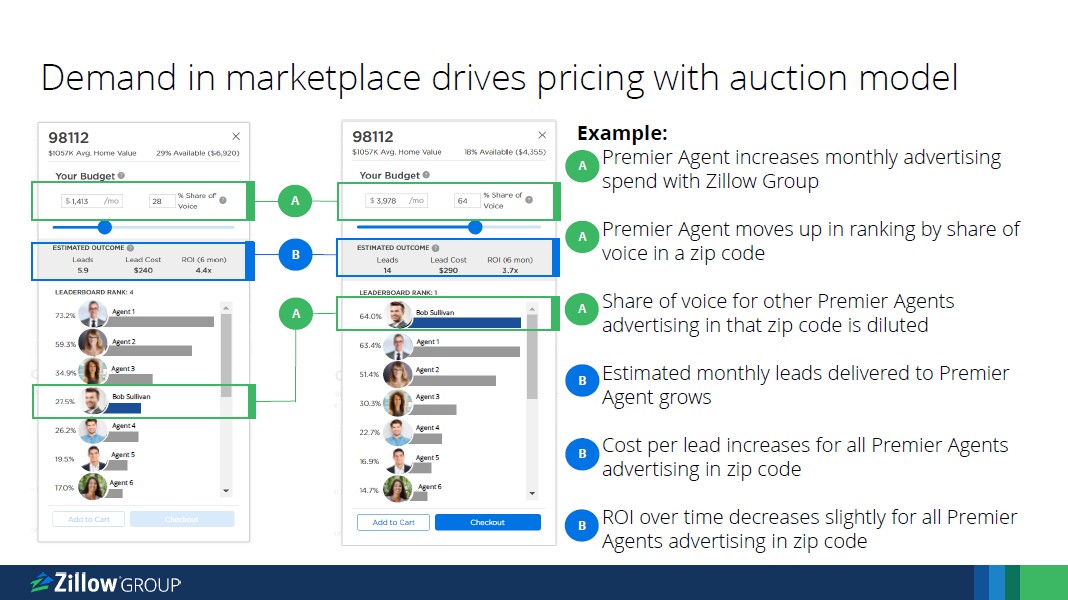If you’ve ever looked for a home online or just vicariously checked out what’s for sale chances are that you’ve used Zillow (Zillow also owns Trulia) or Realtor.com. These Web sites have made MLS listings directly available to the masses and they’ve added various information resources to keep you engaged on their Web sites. It’s totally changed the way people shop for homes. Often, when a home buyer initially reaches out to us, they already have a list of homes in mind that they want to visit.
Of course, running sophisticated Web sites like these, which aggregate data from hundreds of sources, is no simple task. It costs hundreds of millions of dollars so how exactly do these Web sites pay for all this and make money? Obviously it’s advertising – mostly from realtors but also from mortgage lenders looking for leads. And I’m estimating that between the two big Web sites I mentioned above realtors are going to spend about $1 B this year just trying to get you as a customer. And it’s going to just keep growing over time.
Here is how it all works. It turns out that the value of a client to a realtor is about 25% of the commission. That’s the typical referral fee between realtors. When a realtor offers to refer you to another realtor they’re not doing it out of the goodness of their heart. They want that referral fee while they watch the referred realtor do all the work. Since realtors can spend up to 50% of the their time just trying to generate business paying a 25% referral fee is pretty reasonable.
So Realtor.com and Zillow come along and they basically pimp you out to realtors for a fee. When you request more information on a listing you may be thinking that you are going to be connected with the listing agent but that’s not how this works. They ask you for your contact information which they then send to a realtor – actually, Zillow sends your information to a realtor that you select but Realtor.com will send your information to 3 realtors that paid for your contact information. Within seconds of hitting the send button you will get a call from a Zillow realtor or, in the case of Realtor.com, you will actually get 3 calls, which you are totally not expecting. Those 3 Realtor.com realtors are in a death race to get to you before the other 2 do.
A few realtors have really invested heavily in these platforms, spending tens, if not hundreds, of thousands of dollars per year acquiring leads. In fact, these marketing channels have been the primary driver of some of the Chicago area’s top producers getting their volume. As I’ve pointed out many times being a top producer doesn’t necessarily mean that you are a good realtor but it does mean you are very good at generating business.
Obviously these Web sites are going to charge realtors as much as they can get away with so the pricing of the program is roughly proportional to the value of the potential clients in a given area – i.e. Lincoln Park is more expensive than McKinley Park. In addition, as realtors have become more adept at converting leads to clients these Web sites have raised their fees. Realtors that are not very good at converting leads drop out of the program and are eventually replaced by those who are better at converting. It’s a de facto auction model, which Zillow explicitly laid out in a recent investor presentation. You can click on the image below for a larger version.
We should also expect that the cost of these programs would stabilize at around 25% of the commissions generated from the programs. If you believe Zillow’s investor presentation numbers it looks like they were at just under 14% for 2016. But I would expect this percentage to rise as realtors get better at converting leads and the auction process matures.
The power of these lead generation channels will ultimately support high real estate commissions. Because these third party intermediaries step in between the consumer and the realtor they are capturing a portion of the real estate transaction value chain (ultimately 25%). Only realtors that charge full commission will be able to afford to pay these guys so the consumer probably won’t get a commission rebate, or a discounted commission on the sell side, from any of the realtors they find through these sites.
However, let me put this commission dynamic in historic perspective. It turns out, ironically, that this is nothing new. Real estate agents have always chosen to compete on the basis of aggressive lead acquisition strategies as opposed to lowering their commissions. Before the Internet there was the newspaper and other print media on which realtors spent perhaps even more money than they do now on the Internet. As I’ve pointed out in the past, their real estate advertising spend was never about marketing their properties for sale but rather about marketing themselves. So all that has changed is that print has been replaced by the Internet and the only way the consumer is going to save money is by seeking out realtors that take a smaller cut of the deal through other channels.
#Zillow #Realtors #RealEstateCommissions
Gary Lucido is the President of Lucid Realty, the Chicago area’s full service discount real estate brokerage. If you want to keep up to date on the Chicago real estate market, get an insider’s view of the seamy underbelly of the real estate industry, or you just think he’s the next Kurt Vonnegut you can Subscribe to Getting Real by Email using the form below. Please be sure to verify your email address when you receive the verification notice.
